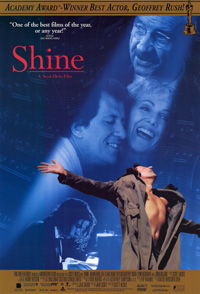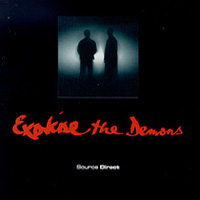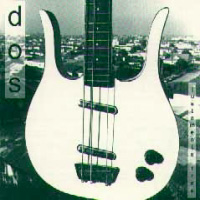 Shine
Shine
with Geoffrey Rush, Armin Mueller-Stahl, Justin Braine
Directed by Scott Hicks
Written by Jan Sardi (Fine Line)
by Lex Marburger
There is a point in any task that requires focus – be it art, sports, mathematics, dance, physics, or music – where the conscious mind shuts off and reality fades away. Athletes call it “The Zone,” though it goes by many different names. Nowhere has the concept of The Zone been so brilliantly portrayed as in the performance of Rachmaninoff’s Third Concerto in Shine. David (alternately played by Geoffrey Rush, Mex Rafalowicz, and Noah Taylor), a boy who has always been denied natural expression and emotion by his father (portrayed here as one mean-ass psycho son of a bitch), performs one of the most difficult piano pieces ever written for his final competition at the Royal Academy of Music in London. His behavior since leaving home (a traumatic experience in itself) has gotten gradually more eccentric, exemplified by his hair, growing steadily longer, and his glasses, slowly showing wear and tear. He has studied virtually non-stop for this competition, and the moment has finally come. Sitting down at the piano, the orchestra begins, and he soon follows with a soft grace, fingers effortlessly gracing the keys. It is interesting to note that up until this point, we almost never hear David play for more than a few seconds. This performance is the first time anyone in either audience (on the screen and in the theater) has heard him play. And, of course, he’s fantastic. But tension builds due to the fact that we haven’t been subjected to this long a stretch of music yet. Will he fail? Will the wrong note be glaringly struck? Then it happens: The film slows down abnormally, the sound along with it. The deep muted plunks from the keys are all that is heard. A shot of David’s face, eyes closed, sweat dripping down his face, hair slick and hanging like tentacles from his head, darkness all around, all sense of time vanished. David is in The Zone. All tensions, repressions, anxieties, mental blocks have vanished. He is no longer fretting, or thinking, or hampered by his father’s demands, punishments, condemnations. True emotion, having been bottled up for decades comes rushing out of him, into his hands, into the music. The film returns to normal speed, and we see what the film’s audience sees: David maniacally tossing his head, no longer in control, the music playing him, hair damp with sweat, hands pounding the keyboard, the sum of human emotion, rage, despair, joy, ecstasy, all being delivered by this child prodigy. The piece comes to its crashing end, David stands to the thunderous applause of true appreciation of beauty, and he collapses, his brain irreparably damaged by the sudden bursting through of passion, his lifetime of repression, his personality of submission to his father utterly obliterated, crushed. His freedom has cost him his sanity. Such is the price of the muse.



